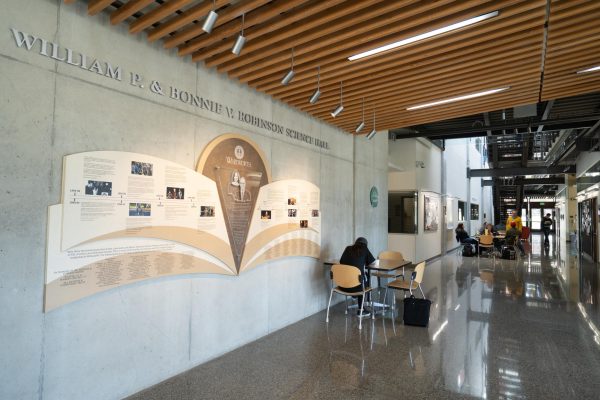This year, Whitworth University has been named a recipient of the National Science Foundation’s Scholarships in Science, Technology, Engineering and Mathematics (S-STEM) Grant. Whitworth is one of 12 schools to receive a total award of close to $2 million.
The Track 2 project called “S-STEM: Cultivating Communities and Empowering Futures for STEM Career Success” will directly impact high-achieving, low-income students by providing financial support, academic assistance and career exposure.
Kerry Breno, an associate professor of chemistry, was the principal investigator and a member of the team that got the grant.
“The goal of the program is to increase students going into and completing science and technology degrees,” said Breno. “So, this grant provides scholarships for incoming students in STEM and is renewable while they’re here.”
The project will provide at least 80 scholarships to at least 18 students majoring in biology, chemistry, engineering, physics, math and computer science disciplines, including several applied disciplines like bioinformatics and human-computer interaction. First-year college students will receive up to five years of scholarship support while pursuing their degrees.
Aaron Putzke, a biology professor, was also a part of the team that worked to secure the grant. “It’s an exciting grant and it was really a collaborative effort,” said Putzke. “This is really built to help students get out there and make positive contributions in the world.”

Along with scholarships, support systems will be provided within a living-learning community, including a summer bridge program for math skills, peer and faculty mentorship, and a first-year seminar, including a speaker series, shared coursework, extracurricular cohort-building events, activities to promote career exploration and readiness, internships and undergraduate research opportunities.
“These scholars that come in and others will be offered the opportunity to be in this STEM learning community where they will be mentored and advised as a group,” said Putzke, “and so, this part becomes open to everybody, and we don’t want to build support only for a small handful of people, we want to build the support mechanisms to give access to all students who need it.”
The need for support in STEM fields is especially important given national trends. “Nationally, there’s a huge dropout rate for students in STEM,” said Breno, “and there’s just not enough STEM professionals around, and it’s one of those things where if you do make it through, you’re gonna get a job.”
Beyond career opportunities, the program is about empowering students to make a difference. “It attracts students that want to do good things,” said Putzke, “part of this is connecting students with career tracks that are going to help them achieve those goals of contributing to the world.”







